The Cambridge History of English Romantic Literature » książka
topmenu
The Cambridge History of English Romantic Literature
ISBN-13: 9780521790079 / Angielski / Twarda / 2009 / 796 str.
The Cambridge History of English Romantic Literature
ISBN-13: 9780521790079 / Angielski / Twarda / 2009 / 796 str.
cena 792,13 zł
(netto: 754,41 VAT: 5%)
Najniższa cena z 30 dni: 760,64 zł
(netto: 754,41 VAT: 5%)
Najniższa cena z 30 dni: 760,64 zł
Termin realizacji zamówienia:
ok. 16-18 dni roboczych.
ok. 16-18 dni roboczych.
Darmowa dostawa!
A comprehensive overview and analysis of the field by an international team of distinguished scholars.











